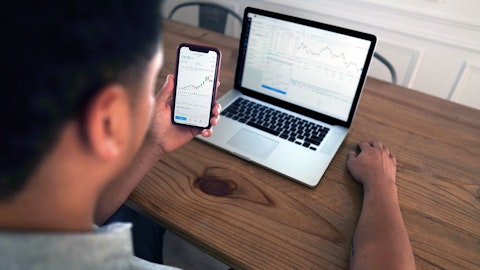Apollo Commercial Real Estate Finance, Inc. (NYSE:ARI) Q4 2022 Earnings Call Transcript February 9, 2023
Operator: Good day and welcome to the Q4 2022, Apollo Commercial Real Estate Finance, Inc.’s Earnings Conference Call. At this time all participants are in a listen-only mode. After the speaker presentation, there will be a question-and-answer session. . I would like to remind everyone that today’s call and webcast are being recorded. Please note that they are the property of Apollo Commercial Real Estate Finance, Inc. and that any unauthorized broadcast in any form is strictly prohibited. Information about the audio replay of this call is available in our earnings press release. I’d also like to call your attention to the customary Safe Harbor disclosure in our press release regarding forward-looking statements. Today’s conference call and webcast may include forward-looking statements and projections, and we ask that you refer to our most recent filings with the SEC for important factors that could cause actual results to differ materially from these statements and projections.
In addition, we will be discussing certain non-GAAP measures on this call, which management believes are relevant to assessing the Company’s financial performance. These measures are reconciled to GAAP figures in our earnings presentation, which is available in the stockholders section of our website. We do not undertake any obligation to update our forward-looking statements or projections, unless required by law. To obtain copies of our latest SEC filings, please visit our website at www.apollocref.com or call us at 212-515-3200. At this time, I’d like to turn the call over to the Company’s Chief Executive Officer, Stuart Rothstein. Please go ahead.
Stuart Rothstein: Thank you, operator and good morning, and thank you to those of us joining us on the Apollo Commercial Real Estate Finance fourth quarter 2022 earnings call. I’m joined today by Scott Weiner, our Chief Investment Officer and Anastasia Mironova, our Chief Financial Officer. The consistent credit performance of ARI’s floating rate portfolio of loans produced strong operating results in 2022 as evidenced by substantial earnings growth and a well-covered common stock dividend. Our team originated over $3.7 billion of loans and grew the portfolio to $8.7 billion at year-end. Notably, despite some lingering misperception, 93% of ARI’s portfolio now consist of first mortgage position. Beyond originations ARI achieved significant milestones with respect to several focused assets freeing our underperforming capital and redeploying it into newly originated loans underwritten to generate attractive risk adjusted returns.
Proactive steps also were taken to strengthen ARI’s balance sheet, expanding and diversifying financing sources and extending the term on several facilities. As a result of these effort, ARI continue to demonstrate the resilience in earnings power of the company’s business model. 2023 begins with a real estate markets continuing to face headwinds from elevated interest rates and concern over both additional Fed rate increases and the potential for an economic recession. While historically, inflation has been a positive for in-place real estate, in the short-term, the rising rates is leading to a repricing of assets. Sellers and buyers as well as lenders continue to reconcile their views on value and as a result, transaction volume has slowed.
Importantly for ARI, given the robust level of loans originated over the past two years, ARI’s portfolio remains well-positioned to continue generating distributable earnings in excess of the common stock dividend, while taking a measured and opportunistic approach with respect to new capital deployment. As always, ARI is fortunate to benefit from Apollo’s broader commercial real estate debt platform which originated over $13 billion of loan transactions last year. Apollo remains active, originating and closing transactions in the marketplace which enables ARI to access real-time market data and information as we assess the use of the company’s investable capital. While transaction velocity has slowed, the market remains open for assets to be refinanced and as evidenced by the $2.2 billion of repayments received in ARI’s loan portfolio over the past year.
ARI’s repayments were across varying property types and geographies. In most instances, properties were refinanced as they achieved business plans. However, there were also situations in which other capital sources were willing to provide financing in order to put capital to work and attractive attachment points and yields and ARI was the beneficiary of a full or partial pay down. Notably, ARI had several office loans either fully or partially repay totaling approximately $650 million during 2022. And as of year-end, office exposure had decreased from a high of nearly 30% at the end of 2020 to just 19% of the current portfolio. That exposure was further reduced after quarter end, as ARI received full repayment of an off of a loan on a London Office building and partial repayment on loan secured by office buildings in Chicago.
What we have seen with respect to repayments is the importance of working with both well capitalized high-quality institutional sponsors and subordinate lenders. In many instances, borrowers recognize the long-term value inherent in their underlying properties and have the patience and capital to support properties until business plans are achieved and markets normalized. Shifting to the portfolio at year-end ARI had 61 loans totaling $8.7 billion, near quarter end, we sold the properties underlying ARI’s Miami Design District loan to a sponsorship group, with significant experience in the neighborhood, which freed up approximately $180 million of capital. As part of the transaction ARI provided 60% loan to cost seller financing. There has also been positive operating performance at ARI’s Hotel in Washington DC.

Photo by dillon kydd on Unsplash
While we are still considering selling the asset, the hotel produced positive cash flow in 2022 and is rapidly approaching pre-pandemic performance levels. Work remains on the other focused assets, however, we are extremely pleased with the positive outcomes achieved this past year, which we believe highlights the strength of Apollo’s asset management capabilities, in addition to the ongoing focus and commitment to the preservation of capital. Turning to the right-side of the balance sheet as we look ahead to 2023 ARI’s only corporate maturity is the $230 million of convertible notes coming due during the fourth quarter of the year. Similar to the convertible notes that matured in 2022, ARI will closely monitor the credit capital markets as the year progresses and consider a capital market transaction to repay the notes, while also at all times being prepared to repay the notes using its existing liquidity if needed.
Before I turn the call over to Anastasia, it is worth highlighting that ARI is current quarterly dividend run rate of $0.35 per share, the company is paying common stockholders roughly a 12% annualized yield, coming off a quarter in which ARI earned $0.48 per share while trading at approximately 75% of book value, with earnings supported by a portfolio consisting of 98% floating rate predominantly senior loans. With that, I will turn the call over to Anastasia to review ARI’s financial results for the quarter.
Anastasia Mironova: Thank you, Stuart, and good morning, everyone. ARI produced strong financial results in Q4. With distributable earnings prices realized losses in impairment and investment of 69.3 million or $0.48 per share. GAAP net loss available to common stockholders was 7 million was $0.06 per diluted share of common stock. ARI’s portfolio remains well-positioned for rising interest rates, as 98% of our loans are floating rate. And as of quarter end, all our U.S. and European floating rate loans were in excess of their respective . An additional increase of 50 basis points and the global floating rate interest benchmark would lead to approximately $0.09 per share increase in net interest income. Portfolio credit also remains strong, with no additions to the list of focused assets during the quarter and the resolution of one of the largest focus assets, the Miami Design District loan as mentioned by Stuart.
The resolution of this asset freed up non-performing capital, a portion of which was immediately redeployed into seller financing. As of December 31, the weighted average risk rated of ARI’s loan portfolio was 3 was less than 3% of the loans in the portfolio based in principle outstanding, risk rated four to five. During the quarter, there was an increase in the general CECL allowance were 5.7 million, bringing it to 36 basis points of the loan portfolio is amortized cost basis as of December 31. The increase is attributable to a more conservative macro outlook with respect to the economy, partially offset by the impact of portfolios strengthening. Also, during the quarter, ARI recorded 36.5 million increase in the specific CECL allowance for the mezzanine loan secured by the for sale residential project located at 111 West 57th Street.
In accordance with ARI methodology, the loans that are individually assessed with specific CECL allowance would compare the fair value of the underlying collateral to the current value of the loan. The value of the underlying collateral is typically determined using the cash flow forecast model. In the instance of 111 West 57th Street, cash outflows into model comprise the expected to remain in cost to complete the project including carry costs and borrowings. Capital inflows are based upon net sales proceeds driven by assumptions around the timing and pricing of future unit sales, which they can take out a number of factors, including price sales activities, recent and expected closings, overall market activity, and current value interest, as indicated by foot traffic and broker inquiry.
For accounting purposes, we then calculate the net present value or NPV of expected cash flow and compare the NPV to the current carrying value of ARI’s outstanding loans. In our most recent analysis, the forecast model still shows that the nominal projected cash flow NPV discounting exceeds ARI’s fully funded basis net of the price 30 million reserves. However, given the more conservative view on timing and net sales proceeds, on an NPV basis with the additional 36.5 million reserves. It is worth noting that to the extent our forecast is realized and ARI’s current basis prove to be covered by nominal proceeds. In the incremental reserves taken based upon the discounted cash flow analysis will be reversed over time. We will continue to provide updates on the project as there may be future differences in the nominal and discounted NPV view of the asset value, which may potentially result in further adjustments to the specific CECL reserve in the future.
It is worth noting that since the refinancing of the Steinway Capital structure in August of 2022, net proceeds from the sale of 70 units have reduced the balance of ARI’s senior loan by 111 million. And the principal balance of the senior loan as of year-end was 277 million. From this point, proceeds from the future unit sales will be used to pay down the senior loan and the mezz-B loan on a pro rata basis until both are fully repaid. Currently, there are two penthouse units in the tower and one-unit in the historical Steinway building expected to close within the next few months. Proceeds from the sale of this three units will further decrease the outstanding principal balance of ARI’s senior loan and mezzanine B loan by approximately 75 million.
With respect to realized events, during the fourth quarter ARI recorded a 24.9 million realized loss in connection with the Miami Design District loan and the loan secured by a hotel property in Atlanta, Georgia. There was no impact to the book value for the year as the realized loss represented the write-off of previous allowances. With respect to the Atlanta loan, we opted to realize the loss in the current quarter due to certain tax structure in consideration. Despite the additional reserves and realized losses taken during the quarter ARI’s book value per share, excluding general CECL reserves and depreciation was $15.78 at year end, an increase of 2% over last year. Book value in 2022 benefited from the company’s earnings in excess of the common stock dividend.
And the gain realized on the acquisition of the multifamily development in Brooklyn known as the Brook. With respect to ARI’s borrowings, ARI is in compliance with all covenants and continue to maintain strong liquidity. ARI ended the quarter with $232 million of total liquidity, which was a combination of cash and undrawn credit capacity on existing facilities, and 1 billion of unencumbered loan assets. ARI’s debt-to-equity ratio at year-end remained constant compared to the previous quarter end at 2.8. We’re currently in discussions with several financial institutions to further expand and diversify our borrowing relationship. And with that, we would like to open the line for questions. Operator, please go ahead.
15 Dividend Stocks That Also Beat the Market and 16 Largest Photography Companies in the World.
Q&A Session
Follow Apollo Commercial Real Estate Finance Inc. (NYSE:ARI)
Follow Apollo Commercial Real Estate Finance Inc. (NYSE:ARI)
Receive real-time insider trading and news alerts
Operator: Thank you. . Today’s first question will come from the line of Steven DeLaney with JMP Securities. Your line is open.
Steve DeLaney: Thanks. Good morning, everyone. And congratulations on the nice close to 2022 terms of resolutions and strong distributable EPS. Starting with the EPS, $0.48 before realized losses, it’s a nice increase over $0.37 in the prior quarter. Can you comment if there were any one-time items or possibly significant prepayment fees that were included in the $0.48 and possibly quantify that for us as far as anything that we shouldn’t expect to see again in the first quarter of this year? Thank you.
Stuart Rothstein: Yes, the simple answer is no, Steve, it’s really the benefit of obviously rising interest rates, but then also putting to work capital that has not been earning a return.
Steve DeLaney: Yes. So more capital invested, and you’ve got a lot more tailwind. So okay. Well, we were $0.40 and perhaps looks down two kind of step added up. But that’s for another time. Stuart, the loan portfolio, you grew, I guess about 10% in 2022 to 8.7. Do you expect net growth in 2023 given your liquidity position? Or how should we think about it, just reinvest and a flat portfolio? Or could it possibly grow? Thanks.
Stuart Rothstein: I think about it a couple of ways. And I don’t want to miss the point that there’s not a lot we have to do in order to keep paying the dividend. And I think that allows us to be somewhat more selective and thoughtful as we think about deploying capital. I think the increase in the portfolio overall was obviously very healthy originations during the first half of last year. But also, as I alluded to, in my opening remarks, I think it’s sort of somewhat misappreciated that we’ve transferred. Not all but just about all of the portfolio from mezz to first mortgage and obviously, first mortgages levered versus mezz loans unlevered just naturally leads to a larger portfolio size. It’s an inexact science. We certainly are open for business and expect keeping our capital working.
But I think from a portfolio sizing perspective, modestly up just as we continue to get paid back on some things and redeploy capital, we’ve got some excess liquidity going into the year, but probably inside of what took place last year vis-Ã -vis portfolio growth.
Steve DeLaney: Thanks for the color. Appreciate it.
Operator: Thank you. One moment for our next question. And that will come from the line of Stephen Laws with Raymond James. Your line is open.
Stephen Laws: I’d love to get some comments, you guys focus more on Europe than most of your peers as kind of looking at your breakout and your . U.K. and Europe is about half of your office exposure, it’s about 70% of your retail exposure is U.K. Can you maybe talk about, pros and cons or what you’re seeing over there that maybe we don’t hear as much being talked about as far as those exposures?
Stuart Rothstein: Yes. Look at a high level, let me start by saying right as you think about what we’ve done over the last 12 to 18 months vis-Ã -vis moving ratings around or taking assets, specific allowances, et cetera notable that none of that activity has been in Europe, which should be certainly an indication from our perspective, we believe the portfolio is performing well. I think at a high level, on the asset side, our strategy in Europe and it’s really been two-fold. We found some situations where we’ve provided loans against things that are longer term lease and envisioned for redevelopment and renovation at some point in the future but feel perfectly comfortable with existing credit today. And then, we’ve obviously done the traditional call it, office renovation, bridge type of lending.




